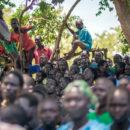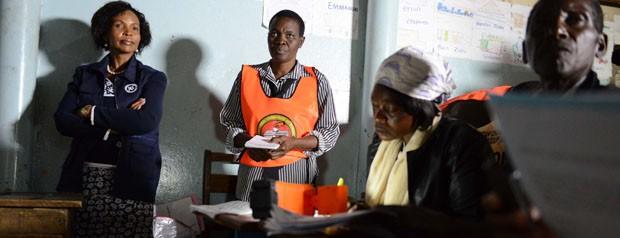Why States Recover: Changing Walking Societies into Winning Nations – By Richard Dowden

 We often get famous professors on stage for our meetings but they are not often joined by the scion of South Africa’s richest family, a rock star and the head of the British army. Last Friday night at SOAS was different. And the man who made the difference and created that strange and wonderful evening last week was the irrepressible Greg Mills of the Brenthurst Foundation, who has made a life out of studying wars and politics in Africa and the rest of the world. There isn’t a conflict zone of the last two decades he hasn’t visited and written about.
We often get famous professors on stage for our meetings but they are not often joined by the scion of South Africa’s richest family, a rock star and the head of the British army. Last Friday night at SOAS was different. And the man who made the difference and created that strange and wonderful evening last week was the irrepressible Greg Mills of the Brenthurst Foundation, who has made a life out of studying wars and politics in Africa and the rest of the world. There isn’t a conflict zone of the last two decades he hasn’t visited and written about.
I have known Greg for many years, first as the Director of the South African Institute of International Affairs and then at Brenthurst. He has written or co-authored four other books on current conflicts and now “˜Why States Recover – Changing Walking Societies into Winning Nations – From Afghanistan to Zimbabwe’.
Why Walking Societies? War does indeed create refugees and in poor countries they seek refuge by abandoning their homes and walking towards what they hope will be safety. The “˜A to Z’ in the title shows just how many countries and conflicts there have been in the last couple of decades. There are 31 mentioned on the contents pages.
The first email I got from him about this meeting was dated 11 September. It reads: “I wondered what the next steps are in arranging the meeting on 10 October?”
“I’ll get back to you” I replied. What 10 October meeting? Nothing in the emails. Panic! A phone call was it? And the big lecture theatres at SOAS – where RAS lives – are difficult to book at short notice. The RAS team swung into action and luckily Professor Stephen Chan managed to secure us a decent sized one at the last minute. We announced the meeting and ordered wine and nibbles for the reception and book signing.
Greg had already booked the other speakers and I was allotted the chair. Stephen Chan did the welcome. Thus began one of the most extraordinary meetings we have ever held.
Praise for the book from Jonathan Oppenheimer who is on the board of the Brenthurst Foundation and whose family built up and owned Anglo American, the mining company, and still own De Beers, the diamond company. He is the Director. Then an alarming account from General Sir Nicholas Carter, Commander in Chief of the British army, of Greg Mills’ hitchhike venture in a petrol tanker across Helmund province in Afghanistan at the height of the war.
The first question, a quick bouncer from a former British ambassador was directed at the General. Didn’t he agree that the decision to rejoin the war in Iraq and Syria was the definition of madness? The General ducked. But the questions kept coming and we had some fascinating exchanges.
And then some music. South African musician Johnny Clegg (a friend of Greg) first talked about growing up among Zulus and how he learnt the rhythms of their walking songs with all the wonderful rhythms and clicks of Zulu speech and song. Then he sang some. It was amazing to see and hear a small white man dancing and singing Zulu war chants and marching songs with all the clicks and guttural sounds of isiZulu.
The Zulus are best known for the Mfecane – “˜the crushing’, when they attacked all their neighbours and turned southern Africa into a war zone for decades. He then showed us another side to the Zulus – how their musicians discovered the concertina, dismantled it and rebuilt it to suit their own music with all the low notes at one end and the high notes at the other.
Mills’ book covers many countries that have recently suffered or been threatened by conflict. But unlike most books about war, it starts with how wars end and demonstrates how some countries take far longer to recover than others. Myanmar, Burma, is his prime exhibit of success, “a model of self-help” which persuaded its largely agricultural population to add value to their crops while the government built roads to get them to market.
His motto is “Buy Hold Fix” which I interpret as meaning that the citizens buy into their convalescent state and commit to rebuilding it with a clear plan. In contrast, many of the countries emerging from war have allowed a small corrupt elite of rent-seekers to own and control the economy as well as the army and police. States that exclude the majority of their citizens by not providing them with the means to become educated and work or trade, are the ones still in the grey area of no war, no peace and may slip back into war.
The greatest sin in Mills’ universe is for outsiders to try to rebuild states, making both the state institutions as well as the physical infrastructure in to a sort of turnkey project according to a western model. Get out of the way and let the locals do it for themselves, he argues. Only they can build institutions that will last. But also ensure that leaders are accountable to their people not to outside aid givers.
The second greatest sin – often created or compounded by the first – is for an elite to emerge with grand houses and flashy cars, who steal from the government coffers and sometimes take the whole economy and rule the country for short term political, using the economic dividends just for themselves.
That, to me, is Africa’s great curse at present: an elite class which, like the aristocracy in pre-revolutionary France, has seized their country’s wealth, spending some of it on flashy cars and palaces and puts the rest in banks in London and elsewhere. The people survive – or not – on less-then-a dollar-a-day poverty.
Mills cites the following as the primary blocks with which to rebuild collapsed states: accountable leaders, efficiency, the rule of law (especially land rights), and the deregulation of the economy. Aid and aid agencies are condemned for thinking they can transform countries or lead recovery. As Africa has regained its self confidence in the last decade that has become less and less true as aid agencies, both governmental and non-governmental, have become more and more modest about what they can or cannot do.
Looking across Africa today, it is difficult to disagree with Mills’ broad conjectures. Yet today’s greatest irony is that two of the most successful countries economically in Africa that he cites, Rwanda and Ethiopia, are among the least democratic and have poor human rights records.
Mills tried to live and work in Rwanda but did not find the model he was hoping for. He found it far too bureaucratic and controlled top-down. Like most he admires President Paul Kagame and his vision for rebuilding a resource-poor country but Mills says he is puzzled by his involvement in Eastern Congo. He does not touch on the looting of Eastern Congo by Rwandan-backed militias which brought huge commodity wealth to Rwanda but contributed to the deaths of millions, many more millions in fact than died in the Rwandan genocide. Hopefully with the surrender of the M23 militia that period has now come to an end but a trip to Goma or Masisi might be very revealing.
Mills’ book is an important work, dealing as it does with what may be the defining question of the 21st Century: whether the promise made in the 20th century that the poor undeveloped world and its masses will catch up and match the rich capitalist countries will be fulfilled, or whether it will continue to enrich the developed world but remain slumped in poverty and conflict.
Richard Dowden is Director of the Royal African Society and author of Africa; altered states, ordinary miracles. Follow Richard on twitter@DowdenAfrica







Thanks Richard Dowden for this insight full comment. I just read Fukuyama’s “Political Order and Political Decay” that has many implications for development. According to Fukuyama state, rule of law have developed in sequences in time and space. Some countries like China and Prussia developed strong successful states as response to military threats long before the advent of democracy. It took outside interference to make Germany a democratic state in 1945. Rwanda and Ethiopia follow a similar sequence with building strong successful states. The challenge is to constraint the power of the executive by rule of law and democracy.